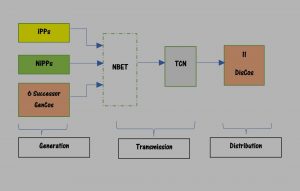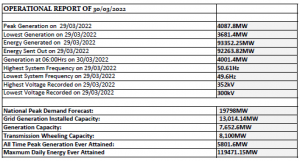If anyone still doubts that Nigeria’s power sector is in a conundrum, then, that person may need to be critically examined more than the crisis-driven sector itself. The worst is that finding a lasting solution to the problems rocking this crucial sector of the economy appears like finding a virgin in a maternity ward.
The Nigerian power sector has undergone numerous reforms and deregulation, but despite the restructuring, the sector continues to be overwhelmed with critical challenges bordering on electricity generation shortfalls, electricity transmission bottlenecks and distribution complexities.
Can there ever be the possibility of getting the monkey off the back of the power sector in Nigeria? Well, this essay aims at answering the question. It critically examines the problem(s) with Nigeria’s Electricity Industry while proffering ways for its sustainable reformation.
Brief History, Overview and Structure of Nigeria’s Power Sector
The trajectory of Electric power development in Nigeria could be traced from the end of the 19th century when the first generating plant was installed in the city of Lagos in 1896. The plant had a capacity of 60KW [1].
Fast forward to 1950, the government passed the Electricity Corporation of Nigeria Ordinance No. 1 of 1950 to integrate power development and make it effective [2]. This Ordinance brought all the electricity undertakings and the electricity sections of the then Public Work Development (PWD) under control. The Electricity Corporation of Nigeria (ECN) then became the statutory body responsible for the generation, transmission, distribution and sale of electricity to all consumers in Nigeria [2].
Later in 1962, the Niger Dams Authority (NDA) was established by an Act of the parliament. The NDA was responsible for the construction and maintenance of dams for electricity generation. The ECN and the NDA were later merged to become National Electric Power Authority (NEPA) by Decree No.24 of 1972 [3]. NEPA was to develop and maintain an efficient and coordinated economic system of electricity supply for all parts of the Federation.
However, the clamour to reform the Electricity industry informed the transformation of NEPA into Power Holding Company of Nigeria (PHCN) [2]. But the Electric Power Sector Reform Act of 2005 later unbundled PHCN into 18 successor companies comprising 6 Generation Companies called Gen-Cos, 1 Transmission Company called Transmission Company of Nigeria (TCN) and 11 Distribution Companies called Dis-Cos. The Dis-Cos were strategically spread across the six geopolitical zones of the country. This is why a structure involving three major sub-sectors in the Power sector can be identified. They are the Generation, Transmission and Distribution sub-sectors which are depicted in their simplified form in Figure 1.
A breakdown of the sub-sectors follows.
There are a lot of technicalities, jargon and complexities involved when discussing the electricity sector, but the writer attempts at keeping the essay as simplified as possible for a wider cross-section of the online readers. In the light of this, the words ‘power,’ ‘energy’ and ‘electricity’ may be used interchangeably.
Generation
Aside from the 6 Gen-Cos unbundled from PHCN, there are also some new Independent Power/Electricity Producers (IPPs) as well as the National Integrated Power Projects (NIPPs) as seen in Figure 1. They all contribute to raising the number of grid-connected power generating plants in the Nigerian Electricity Supply Industry (NESI) with a total installed generating capacity of 12,800MW and an available capacity of 7,139.6MW [4].
It is important to state that thermal-based generation constitutes a greater percentage of the installed capacity, closely followed by Hydro based power generation. This means that majority of our power plants are gas-fired. Keep this in mind because it will help to understand the dynamics of some challenges facing the electricity industry.
Transmission
The privatization of PHCN was finally established in 2013 with the Federal Government retaining the ownership of the transmission sub-sector. In this case, the TCN’s primary role is to provide stable evacuation of power generated from the Gen-Cos to the Dis-Cos without system failure. A vital information available in ‘tcn.org.ng’ indicates that TCN performs three major functions, which are: provision of transmission services, system operation services and market operation services.
Also, the TCN supplies power to neighbouring countries in Africa, namely: Niger Republic, Benin Republic, Togo and Burkina Faso. However, it may shock the reader to learn that some of these countries are better off than Nigeria in terms of reliable and adequate electricity supply. Now, isn’t that ironic?
Distribution
The 11 distribution companies are spread across geopolitical zones’ cities in the country. They are Abuja, Benin, Eko, Enugu, Ibadan, Ikeja, Jos, Kaduna, Kano, Port-Harcourt and Yola. These Dis-Cos sign a Power Purchase Agreement (PPA) with the Nigerian Bulk Electricity Trading Plc (NBET), a company owned by the Federal Government which is the sole entity set up to engage in the purchase and resale of electricity and ancillary services from the Gen-Cos.
Figure 1: The Nigerian Power sector in a simplified form

The Big Elephant in the Room
The inefficiency as well as inadequate facilities to boost electricity supply in the face of increasing population, and an increasing business environment all combine to create electricity supply problems. While electricity demand is increasing due to population explosion, supply tends to be decreasing.
These supply inadequacies have damaging consequences on all sectors of the economy and therefore encourage the people to source alternative, but unhealthy and expensive electricity sources through imported petrol and diesel generators.
Some analysts have claimed that importers of these generators into the electricity market deliberately frustrate the efforts made by the government to maintain adequate electricity supply across the country. But it is left to be seen if this claim is true because, there have been many policy statements regarding Nigeria’s willingness to increase power generation, but the available generation capacity does not always match the increase in demand.
Nigeria boasts of Africa’s largest economy, but power sector irregularities restrict its growth. The country is endowed with numerous natural resources, and it has the potential to generate 12, 522 MW of electric power from existing plants [6]. On most days, however, it is only able to dispatch around 4,000MW which is insufficient for a country of over 195 million people [6].
Challenges
On Tuesday, March 15, 2022, the power sector witnessed another electricity system collapse. There appears therefore to be no end to the myriads of challenges facing the sector. The recent collapse of the national grid resulted in a prolonged power outage that led to the plummeting in the output of several companies while throwing many households into darkness.
The development came barely 24 hours after the national grid collapsed in the early hours of Monday, March 14, 2022. It is imperative to note that the national grid is the network of power stations, power lines and electricity infrastructure that allows electricity to be generated, transported and utilized across the country. Aside from the recent collapse of our grid in February and March this year, industry data reveal that Nigeria’s power sector has since 2013, when it became privatised, suffered over 123 (partial and total) grid collapses between 2013 to 2021 [7][9][10][12].
Table 1: Operational Report of March 30, 2022. Source: www.nsong.org/ [8]

The information available at the Nigeria Electricity System Operator website of the TCN under the daily operational report of March 30, 2022, as seen in Table 1 above, indicates that the National Grid has an installed capacity of 13,014.14MW while Peak power generation as of March 29, 2022, was 4,087.80MW [8]. This represents a paltry 31.4% of the installed capacity, a figure far below the demand of a country where a large percentage of business establishments and micro, small and medium enterprises (MSMEs) are heavily dependent on electricity to power their daily activities.
To this end, Businesses begin to source for and invest in building and maintaining alternative sources of power since regular, consistent and adequate electrical power can no longer be guaranteed from the national grid.
The painful situation is that the national electricity grid would suffer a system collapse amid a surge in the prices of fuel and diesel, and this takes a significant toll on business. This inadvertently raises concerns about the Gross Domestic Product (GDP) of the economy. There is therefore no gainsaying that a regular and adequate supply of power is the livewire of any economy.
The Causes: A Complicated Blame Game
The TCN attributes most of the service interruptions and grid collapse in recent times to the inability of the Dis-Cos to accept electricity load. It claims that by doing so, they cause system imbalance which affects the Gen-Cos (the electricity producers) to a high extent and thereby depriving them of the ability to sell the output of their plants. This is why the Gen-Cos have maintained that asking them to increase electricity production in the wake of increasing demand without commensurate evacuation, translates to more risks for them in terms of a machine breakdown, maintenance and cost of repairs.
The Gen-Cos also accuse NBET, a company owned by the Federal Government of owing them N1.644 trillion [9]. This according to the Gen-Cos is the cost of generated but unused electricity, a development which continues to frustrate them from meeting up with their obligations.
In the meantime, another cause for power inadequacy for consumers is the quantity, quality and cost of gas being delivered to the Gen-Cos. Recall that a greater percentage of Nigeria’s electricity generation is thermal [13]. This implies that whenever there is a gas supply shortage occasioned by acts of terrorism and vandalism of gas pipelines, the national grid is bound to collapse.
The TCN who throws the blame does not also come out smelling of roses. A report obtained by Vanguard reveals that the current transmission network of the TCN is characterised by factors such as ageing network, obsolete substation equipment, overloading of certain transmission corridors, poor operations and maintenance etc [10].
Also, the issue around system collapse indicts the TCN with regard to its inadequate wheeling capacity and spinning reserves for generating power stations. By spinning reserve, it means backup generation capacity that is ready to be deployed quickly in the event of any of the Gen-Cos suffering an unexpected outage. This reserve compensates for power outages during grid collapse.
By TCN’s limited wheeling capacity, it implies that the transportation of electric power from within the national grid to all electrical loads outside the grid boundaries becomes greatly constrained. This is why the transmission system is said to be the weakest link in Nigeria’s Electricity Network [11]. It can evacuate only about half of the currently installed generating capacity [11].
So far, the essay has exposed that at the root of the conundrum in the power sector is the issue of the national grid collapse, aggravating debt profiles, and defective policies amongst the Gen-Cos, TCN and Dis-Cos leading to disruptions across the entire value chain within the sector.
Way Forward: Strategies for Reforming the Power Sector
The survival of Nigeria’s economy no gainsaying depends greatly on sustainable solutions to the intractable crisis rocking the power sector. Regrettably, successive administrations have promised to turn around this crucial sector, but they all have failed to do so, all to the disappointment of about 200 million Nigerians.
The present government must therefore show willingness and commitment to truly reform and decentralize the sector. To this end, the National Assembly should expunge power generation, transmission and distribution from the exclusive legislative list in the ongoing constitutional review exercise. This will empower states to generate, transmit and distribute electricity, and thus reduce the burden on the national electricity grid. The President should give the bill for this amendment accelerated passage for it to become an Act whenever the buck stops on his desk.
It is also recommended that stakeholders in the power sector must eschew corruption, administrative inefficiency and managerial incompetence. Round pegs should be put in round holes. A situation where a non-technocrat, say a lawyer or a linguist who doesn’t understand the rhetoric, technicalities and complexities of the electricity industry is made the minister for power or head of any agency in the sector should be avoided completely. In this regard, the usual ‘take a bow and leave’ cliché during ministerial screenings on the floor of the senate should be discontinued.
In a related development, the legislative arm of government should take their oversight functions regarding the power sector seriously. They must ensure full implementation of power sector budgets in other to check the endemic corruption associated with the sector.
Now, the trio of Attorney General (AG) of the Federation and Minister of Justice Mr Abubakar Malami, the Chairman of the Economic and Financial Crimes Commission (EFCC) Abdulrasheed Bawa, and the Chairman of the Independent Corrupt Practices and Other Related Offences Commission (ICPC), Professor Bolaji Owasanoye should revisit and fast-track prosecution of all cases of corruption in the power sector and ensure effective recovery of stolen public funds. The outcome of these cases should also be made public.
When this is done, the Federal Government can now wear the moral fabric to seek financial support from international institutions like the World Bank and other development partners and donor agencies for the purpose of revamping its critical infrastructure involving the ageing transmission network and obsolete substation equipment in the power sector. This will help TCN have more wheeling capacity and procure more spinning reserves from the Gen-Cos to forestall national grid collapse going forward.
It has also been proven that issues relating to the national grid are at the centre of the challenges the power sector face. Therefore, one best way to fix the problem is for concerned authorities to begin to think out of the box to develop off-grid solutions. How? A sustainable master plan to support renewable energy should be encouraged. But then, it comes with a challenge. Most renewable energy solutions are expensive and a greater percentage of electricity consumers in Nigeria are low-income earners.
On the one hand, installation costs of these off-grid solutions are capital intensive and this makes them unattractive to investors. On the other hand, consumers seemingly are unable to pay electricity tariffs from these solutions due to cost. So, to ensure its viability and sustainability, it is recommended that government should create enabling environment in the form of tax incentives and an attractive market to encourage private investors in off-grid solutions to have a good return on investments. Also, the government can employ a subsidy approach to help off-grid electricity consumers cushion the effect of tariff payments.
As it has been identified that 80 per cent of power generation in Nigeria comes from Gas [13], an integrated security system comprising surveillance equipment like predator drones, sensors, Closed-Circuit Television (CCTV) cameras and access control should be installed at strategic positions along Nigeria’s critical gas pipeline routes to safeguard them from vandalism.
In conclusion, despite the conundrum Nigeria’s power sector is immersed in, there is still hope for a light at the end of the tunnel. But this will only point the way to the Eldorado and become a remarkable turning point for the power sector if the strategies for reformation presented therein in this essay are painstakingly implemented. Hopefully, when this is done, it will no longer be a case of finding a virgin in a maternity ward; the reformations will get the monkey off the back of the Nigerian power sector.
References
[1] https://tinyurl.com/4x5ubwpt (accessed March 28, 2022 @20:45hrs)[2] https://tinyurl.com/4wm86dhw (accessed March 29, 2022 @18:00hrs)
[3] https://tinyurl.com/2p8dffte (accessed March 30, 2022 @17:00hrs)
[4] https://tinyurl.com/3b9muc2b (accessed March 30, 2022 @17:00hrs)
[5] https://tinyurl.com/2p9hmty7 (accessed March 30, 2022 @17:00hrs)
[6] https://tinyurl.com/3u37rfwn (accessed March 28, 2022 @18:00hrs)
[7] https://tinyurl.com/2p872xrw (accessed March 30, 2022 @17:00hrs)
[8] https://www.nsong.org/ (accessed March 30, 2022 @10:00hrs)
[9] https://tinyurl.com/4wehea9y (accessed March 30, 2022 @17:00hrs)
[10] https://tinyurl.com/353ep6d8 (accessed March 30, 2022 @21:00hrs)
[11] https://tinyurl.com/2d7uzjuc (accessed March 28, 2022 @20:15hrs)
[12] https://tinyurl.com/3xy33a3s (accessed March 30, 2022 @17:00hrs)
[13] https://tinyurl.com/2vhx45cy (accessed April 1, 2022 @10:00hrs)
About The Writer

Chukwuemeka Oluka writes in from Enugu, Nigeria. He is a passionate writer, a research enthusiast and a registered Engineer with COREN. He is also a graduate of Electronic and Computer Engineering from Nnamdi Azikiwe University, Awka. He tweets @mekus_oluka and can be reached via “write2oluka@gmail.com”






